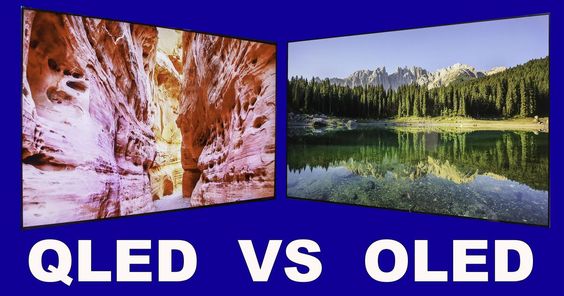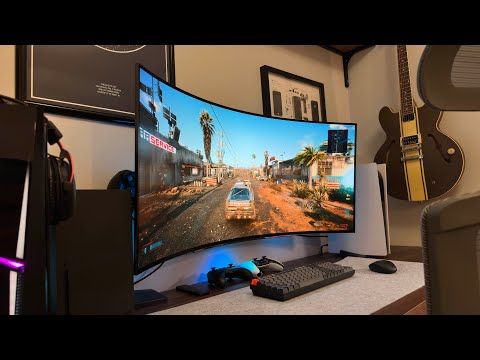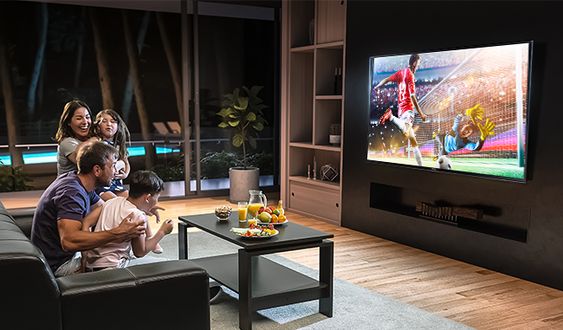OLED vs QLED TVs
Choosing between OLED and QLED TVs depends on your viewing habits and priorities. OLED boasts superior picture quality with perfect blacks and infinite contrast, ideal for dark rooms and cinematic experiences. However, it can be susceptible to image burn-in and may not be the brightest option for well-lit rooms. QLED TVs counter with impressive brightness, making them great for HDR content and rooms with sunlight. While picture quality isn’t quite on par with OLED, advancements have closed the gap. QLED is also generally more affordable and less prone to burn-in. Ultimately, the choice boils down to prioritizing picture quality in a dark environment (OLED) or a brighter, more versatile display (QLED).
In the world of TVs, OLED and QLED are two popular technologies that have been dominating the market. Understanding the differences between them is crucial when making a purchasing decision. Let’s delve into the comparison to see which one suits your needs best. Also, read about S23 vs S23 Ultra
Technology Behind OLED and QLED
OLED technology explained
OLED stands for Organic Light-Emitting Diode. In OLED TVs, each pixel emits its own light, allowing for true blacks and vibrant colors. This technology provides exceptional picture quality and contrast.
QLED technology explained
QLED, or Quantum Dot LED, utilizes quantum dots to enhance brightness and color volume. While it still relies on LED backlighting, quantum dots help produce more accurate colors and improved brightness levels compared to traditional LED TVs.
Picture Quality
OLED picture quality
OLED TVs offer unparalleled picture quality with deep blacks, infinite contrast ratios, and vibrant colors. The self-emissive nature of OLED pixels ensures each pixel is individually controlled, resulting in stunning visuals.
QLED picture quality
QLED TVs also deliver impressive picture quality, with bright and vivid colors. While they may not achieve the same level of true black as OLED, QLED displays offer excellent brightness and are well-suited for bright rooms.
Brightness and Contrast
OLED brightness and contrast
OLED TVs excel in contrast and black levels due to their ability to completely turn off individual pixels. However, they may not reach the same peak brightness levels as QLED TVs, especially in well-lit environments.
QLED brightness and contrast
QLED TVs are known for their exceptional brightness levels, making them ideal for brightly lit rooms or environments with lots of natural light. However, achieving deep blacks can be a challenge due to the reliance on backlighting.

Color Accuracy
OLED color accuracy
OLED TVs typically offer superior color accuracy and saturation, thanks to their self-emissive pixels. Colors appear more lifelike and true to the original content, making OLED ideal for discerning viewers.
QLED color accuracy
QLED TVs also boast impressive color accuracy, thanks to quantum dot technology. While colors are vibrant and rich, some purists may find that they lack the depth and authenticity of OLED displays. Discover more about Aluminum vs Stainless Steel Apple Watch
Viewing Angles
OLED viewing angles
OLED TVs maintain consistent picture quality even at wide viewing angles, making them suitable for large gatherings or rooms with unconventional layouts. There’s minimal color distortion or loss of contrast from any angle.
QLED viewing angles
QLED TVs offer decent viewing angles but may experience some degradation in picture quality when viewed off-axis. This can be a consideration for larger rooms or setups where viewers may not always be directly in front of the screen.
Durability and Lifespan
OLED durability and lifespan
OLED panels are susceptible to burn-in, which occurs when static images are displayed for extended periods. However, with proper usage and care, OLED TVs can still offer a lifespan comparable to other display technologies.
QLED durability and lifespan
QLED TVs are generally more durable than OLEDs and less prone to burn-in. While they may still suffer from image retention in extreme cases, it’s less of a concern for everyday use, ensuring a longer lifespan.
Gaming Performance
OLED gaming performance
OLED TVs offer excellent gaming performance with fast response times and smooth motion handling. The deep blacks and vibrant colors enhance the gaming experience, making OLED a favorite among gamers.
QLED gaming performance
QLED TVs also provide great gaming performance, with high refresh rates and low input lag. While they may not have the same contrast as OLED, QLED displays still offer impressive visuals for gaming enthusiasts.

Price
OLED TV prices
OLED TVs tend to be more expensive than their QLED counterparts, primarily due to the manufacturing costs associated with OLED technology. However, prices have been gradually decreasing as the technology becomes more widespread.
QLED TV prices
QLED TVs are generally more affordable than OLEDs, making them a popular choice for consumers looking for high-quality displays without breaking the bank. There’s a wide range of options available at various price points.
Energy Efficiency
OLED energy efficiency
OLED TVs are energy-efficient, as they only consume power for the pixels that are in use. The ability to turn off individual pixels contributes to lower energy consumption, especially when displaying dark scenes.
QLED energy efficiency
QLED TVs are also relatively energy-efficient, although they may consume more power than OLEDs due to the need for backlighting. However, advancements in technology have led to improved energy efficiency in newer QLED models.
Size and Options
Available sizes and options for OLED TVs
OLED TVs come in a variety of sizes, ranging from compact models suitable for smaller spaces to massive screens for home theaters. Additionally, there are options for curved or flat screens to suit different preferences.
Available sizes and options for QLED TVs
QLED TVs offer a wide range of sizes and options, catering to diverse consumer needs. From budget-friendly models to premium displays with advanced features, there’s something for everyone in the QLED lineup.
Content Consumption
Best content for OLED TVs
OLED TVs excel at displaying content with high contrast and vibrant colors, making them ideal for watching movies, streaming shows, and gaming. HDR content particularly shines on OLED displays, showcasing rich details and dynamic range.
Best content for QLED TVs
QLED TVs are versatile and suitable for various types of content consumption. Whether you’re watching sports, playing video games, or enjoying a movie night, QLED displays offer bright, colorful visuals that enhance the viewing experience.
User Experience and Interface
OLED user experience and interface
OLED TVs often come with intuitive interfaces and user-friendly features, making navigation seamless. Smart TV platforms offer access to a wide range of streaming services and apps, enhancing the overall user experience.
QLED user experience and interface
QLED TVs also provide a smooth user experience with intuitive interfaces and smart features. Smart home integration and voice control capabilities further enhance convenience, allowing users to control their TV with ease.

Integration with Smart Home
Integration of OLED with smart home devices
OLED TVs seamlessly integrate with smart home ecosystems, allowing users to control their TV using voice commands or through smartphone apps. This connectivity enhances convenience and expands the possibilities for home entertainment.
Integration of QLED with smart home devices
QLED TVs also offer robust integration with smart home devices, enabling users to create a connected ecosystem within their home. From controlling lights to managing security cameras, QLED TVs serve as a central hub for smart home automation.
Conclusion
In conclusion, both OLED and QLED TVs have their strengths and weaknesses, making them suitable for different preferences and usage scenarios. For those who prioritize picture quality and are willing to invest more, OLED is the way to go. However, if you’re looking for a balance of performance and affordability, QLED offers excellent value for money.
FAQs
Are OLED TVs better than QLED TVs?
It depends on your priorities. OLED excels in picture quality, while QLED offers better brightness and is more affordable.
Do OLED TVs suffer from burn-in?
While OLED TVs can experience burn-in with prolonged exposure to static images, it’s not a common issue with regular usage.
Are QLED TVs good for gaming?
Yes, QLED TVs provide excellent gaming performance with high refresh rates and low input lag.
Which is more energy-efficient, OLED or QLED?
OLED TVs are generally more energy-efficient due to their ability to turn off individual pixels.
Can OLED TVs be used in well-lit rooms?
Yes, OLED TVs perform well in well-lit rooms, but QLED may be a better choice for extremely bright environments.











